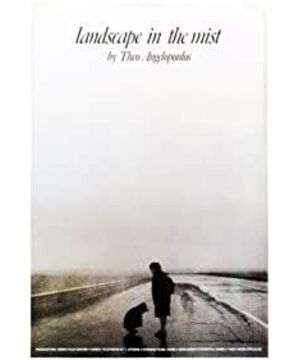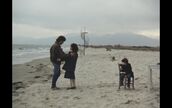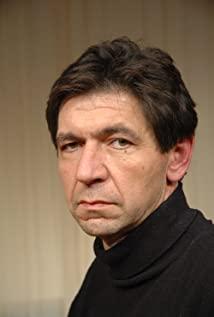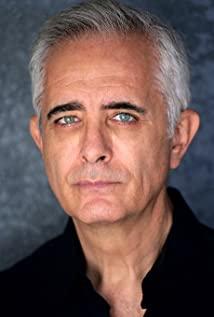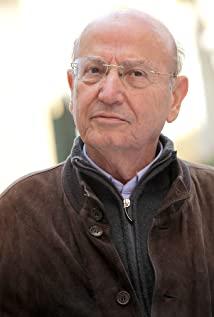when we come back, late, from the garden of hyacinths,
your arms are full, your hair is wet, I can't speak, I can't
see, I'm neither alive Yes, not dead, I don't know anything, and when I
look at the center of light, there is silence.
Desolate and empty is the sea.
---
Elliot's "The Waste Land"
from Angelopoulos, the mythical country of Greece, made in "Landscape In the Mist" and "Landscape in the Mist" in his famous "Homecoming" trilogy An image narrative in An's style that is different from reality and even a "mirage". When Homer recited the legend of Odysseus finding the Golden Fleece and returning home after many obstacles after the fall of Troy more than 2,000 years ago, we see a pair of siblings in the narrative of Angelopoulos Also in the process of finding his father, he kept getting lost and kept walking alone... This journey from Greece to Germany not only tests the hearts of the characters, but also shows the director's views on Europe after World War II. The torture of a "fatherless" complex after the value is lost. Where is home? An extension of this question is how the individual soul in Europe will find an ideal home.
In order to forget the dark history of the Middle Ages for nearly a thousand years and the tradition of scholastic philosophy, the era of enlightenment and rationality opened in modern Europe since the seventeenth and eighteenth centuries went back and searched for the rational brilliance and tradition of the Greek classical sages. As the birthplace of European humanistic thought, ancient Greece has its historical tradition torn apart through the Thirty Years' War in the Peloponnesian, the Hellenistic Age of Alexander, the Eastern Roman Empire and the Arab Turkish Empire. It can be said that there are many gaps between the current appearance of Greece and the city-state era 2,000 years ago. This fault has not only caused Greece’s intermittent amnesia of classical traditions, but also regarded as indelible pain in Europe in the Age of Reason. From Homer to Plato to Aristotle, Greece undoubtedly symbolized the peak of human rationality before the dark iron age. After the Renaissance, from the seventeenth and eighteenth centuries to the twentieth century, where can the glory of reason in the whole of Europe be found? Not in the turbulent, violent and demented revolution of France, nor in Britain, which ignited the industrial revolution and liberalism, but in modern Prussia and contemporary Germany. It was Luther who ignited the religious revolution in Germany, thereby allowing the light of liberty to penetrate and wash away the haze of medieval church domination. Since then, Hegel and Kant in the seventeenth and eighteenth centuries, Marx, Schopenhauer, Nietzsche in the nineteenth century, Weber and Heidegger in the twentieth century, and Goethe and Beethoven in literature and art. and Wagner et al. The German masters have emerged collectively in these three hundred years, and the stars are shining, injecting profound ideas and long-lasting influence into Europe. If we return to the film "Landscape", the journey of the two siblings from Greece to Germany to find their father can be regarded as a "pilgrimage" from the glory of classical rationality to the climax of modern thought?
Ironically, from the many ideological movements in modern Germany, Hurricane Rush and Romanticism were born - its two posthumous children are the nation-state and populism. As a result, the Germanic people who wrote the countless brilliant achievements of modern times for Western civilization have produced totalitarian heresies such as Nazis and fascists. If we think of World War I as the civil war of Western civilization, then in World War II, the cancer of modern civilization harmed the world outside Europe. With the end of World War II, it also marked the fall of the glory of modern Europe - this continent seems to have become the absurd and empty wasteland written by Eliot. This is the European continent that the two protagonists set foot on: the winter sun in the lens Always so bleak and weak, and always glowing with the evil and cold light of Picasso's "Guernica", shining directly on the world (it was on the side of the highway in broad daylight, we witnessed the young sister Ula being killed by the truck driver. rape process); not only are the villages inaccessible, but even the roads are rarely seen. In this fictional narrative, the director not only reminds us of the lost glory of Greece in the golden age, but also repeatedly emphasizes a sense of alienation between people after the loss of European core values. The mist in the film is as ethereal and ethereal as Kafka's "castle", making the two siblings unable to see the way forward, which seems to imply the mental closure of the people living in it.
Just as we knew who the father-killer was at the beginning of "Oedipus the King", so the film "Landscape" made it clear from the very beginning that the two men had a very slim chance of finding their biological father. An Shi said: "Most of my films are about exiles. This kind of exile is not only a refugee, but also an exile at the inner level. The heart has lost its purpose, and is unfamiliar with the world in which it is involved, and I feel that I have changed. I’ve become a stranger.” Rather than saying that the two siblings’ journey to find their father was aimless at the beginning (because the two siblings’ mothers don’t even know who their father is at the beginning of the film), it’s better to say that this is A journey of redemption and growth. The people and things that Odysseus encountered on the way back to his hometown was actually like Xuanzang's study of scriptures, and it was a test for our two lovely little protagonists. When we saw my sister raped by a strange truck driver, she didn't shout, she just sat silently in the trunk of the car, and blood was flowing from her skirt, which was shocking! The helpless younger brother was shouting "Kara" in the opposite direction and looking for his sister. There was a haze around him, so he couldn't see the face of the person. In the scene here, we not only read out the "absurd", but also see the "evil" influence of the loss of moral values in the wasteland on human behavior.
Anshi, who is good at using the general effects of silent films, obviously occupies a larger proportion of the long shots in the film, which not only slows down the pace, but also highlights the desolation of the European continent. When the snow drifted outside the police station, both the staff working in the station and passers-by stopped on the street and looked up. When they were all like sculptures in the snow, only the two brothers and sisters took the opportunity to escape from the pile of Ningli sculptures. In another scene, a group of elderly comedians rehearse by the sea, each wandering back and forth, reciting dialogue, and talking to themselves, creating a space that is relatively independent of others; but when it is learned that their performance has been cancelled Afterwards, they collectively walked towards the beach without a word, and when they looked at the camera, the group portrait formed by their background stood towards the beach, and finally stood there, like a solidified sculpture! The "sculptural feeling" of this group portrait and the unique long shot of silent films have long been an important part of An's style. We can once again experience this kind of camera narrative in "Eternity and A Day". In addition, there is another scene in "Landscape" that deserves our attention: when the two siblings and the young man were looking at the sea, a milky white sculpture of a broken wrist suddenly appeared on the sea surface. When the helicopter hoisted it, the remaining huge broken wrist floated in the air, like a surreal visual effect. Does it herald the rediscovery of the lost and scattered fragments of civilization in ancient reason, and wants to point out the way forward for the protagonist in the vast sea? In addition to sculpture, the sea is also another major element. When the camera looks at the sea from a distance, it not only can set off the insignificance of the characters, but also reflects the loss and emptiness that the characters have grown from the bottom of their hearts because of the uncertain future.
Returning to our two protagonists, due to the premature lack of purpose, in the eyes of our viewers, these two children are gradually lost in this doomed journey, and their destination has become a kind of symbolism. Symbols are like the "windmills" of the Don Quixote wars. Two innocent children endure experiences beyond their age on this almost brutal journey, and they lose their virginity and innocence. They themselves have gradually become a kind of symbol. Civilization also has to go through the process of breaking away from the wild and wild. From the evolution of classical rationality two thousand years ago, to the decline of values led by Germany, the fragments of European civilization are scattered here. on the wasteland. Even the young man who was sincere to the two siblings and offered a helping hand, he didn't know how to move forward. Therefore, the protagonist's "Odyssey" journey is destined to find no "way home" at the beginning, and they are destined to endure hardships, and these two innocent souls are destined to move forward alone, and help each other to prevent wandering in. The infestation of wild ghosts.
This journey is destined to be a journey of "redemption". If the moment when the truck driver raped her sister Carla, it means the collective loss of moral rationality in Europe after World War II. When an unfamiliar non-commissioned officer reached out for money, it was another test. In this double sense, the roles of the tester and the tested person have actually been interchanged: in this wasteland "Trek", the two siblings have always played the role of "tested", but in these two In this scene, sister Ulla is testing the minds of people in the wasteland! When the sergeant waved to suggest that Carla was in the past two trains, we all thought the tragedy was going to happen again, but in the end the soldier stood the test and found a kind of redemption. Why did the director choose a non-commissioned officer who is a soldier to play the test subject? Is it because the military's service career makes it easier to withstand temptation, or is it because of the desire to obtain a moral "redemption" from the image of World War II created by authoritarianism? We don't know this. It is this act of redemption that allows us to see a glimmer of hope in the cruel fairy tales reflected in the film - although the European moral wasteland is barren, it is not irreversible! It was also this opportunity that sent the two siblings directly to the destination border.
In Virgil's epic "Aeneas", a parody of "The Odyssey", Aeneas had to enter the underworld and cross the River Styx before he could see his father again. Since there was no entry permit, under the background of the East-West German split in 1987, the two brothers and sisters had to evade the eyes and ears of the border guards and cross the border in order to enter Germany, including crossing the river in the middle of the night. On the dark river shrouded in mist, the two sisters and brothers were heading towards an unknown destiny. At this time, a beam of light came over, and we only heard a gunshot. Until the next morning, in the thick fog, the two siblings finally came to the "other shore" and boarded the "paradise" with green grass. After the vicissitudes of life, they looked at each other, and the elder sister Ulla asked the younger brother, "Are you afraid?" The younger brother replied, "Not afraid." Then they smiled and rushed up to hold a big tree in the distance. In the wasteland, whether the two are dead or alive, they will not wander in the wasteland or hell - because the wasteland will eventually be reborn, and there will be no more "flowers of evil" on it, but hope tree.
View more about Landscape in the Mist reviews


